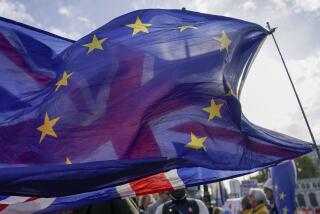The Euro Isn’t a Good Idea for Britain
- Share via
From the West Coast of America, it might appear logical for Britain to adopt the euro and become part of the European Monetary Union. But however attractive it might seem from this distance, to those of us closer to the sharp end of things, every step is flawed and every claim questionable.
Take the great euro-untruth that monetary union is simply an economic arrangement, a matter of smoother, more efficient markets and of sound economic policy dictated by a politically independent central bank. No one believes that.
Whatever some British euro-enthusiasts say, it is a major step to political union that would bring a complete loss of sovereignty to Britain. In 1995, Helmut Kohl spelled it out: “If there is no monetary union, then there cannot be political union and vice versa.”
Is European political integration possible for Britain and should we be part of a single European state? Historically, politically and economically, the answer is no. It would instantly remove our power to control our own interest rates and taxes. Imagine your reaction if U.S. tax rates were set in Ottawa or Mexico City.
Our institutions, legal system and understanding of freedom are exactly opposite to the European centralist tradition since Napoleon. Nor are we so dependent on Europe that economic union is the only option. Britain now has one of the strongest economies in the world. More than half our trade is with the rest of the world and, as Britain attracts most of the inward investment into Europe, there is a strong case for saying Europe needs us rather than the reverse.
Europe is a socialist enclave, and were we to join the EMU we would be forced to undo the Thatcher reforms. “Tax harmonization” is the cry, meaning Britain’s taxes are “too low” and not “fair” to the rest of Euroland. Last year the chairman of the Bundesbank said: “It is an illusion to think that states can hold on to their autonomy over taxation policy” once there is a single currency.
Opinion polls show majorities in Germany and elsewhere, not just in Britain, are opposed to the euro-experiment. The euro and European integration are being forced on reluctant populations by political elites whose grand plans pay no attention to popular opinion.
The euro is an unprecedented attempt to join politically a dozen or more nations with no tradition of labor mobility or a single language, led from Brussels by unelected commissioners who will ensure it “works” by fudging targets and falsifying data, just as happened over the criteria for its implementation.
Our business environment is far more favorable to business, and that is why so many UK entrepreneurs are opposed to joining the EMU. Even continental companies are emigrating to Britain. Our labor taxes are far lower, as is our rate of unemployment (half that of Europe) and our labor laws are far less restrictive. Europe has not begun to reform its nationalized business sector in the way Britain did under Thatcher.
Comparatively, Europe is top-heavy, bureaucratic and sclerotic, its enterprises and peoples hedged in by regulation, taxation and--as we see too clearly from Brussels recently--overrun by corruption, fraud and appalling waste at the top.
It is to our advantage to be part of Europe’s single market, but we should stay out of a common currency for obvious economic, historical and political reasons. Given the craven lack of support in European countries for the U.S. on Iraq, no American would want to see its true ally, Britain, eroding its sovereignty and independence in order to participate in an unreliable and uncertain project that is not at all in Britain’s interest.
More to Read
Sign up for Essential California
The most important California stories and recommendations in your inbox every morning.
You may occasionally receive promotional content from the Los Angeles Times.













